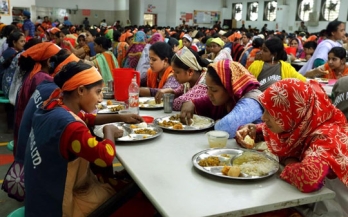- 09/08/2024
Poor diets are the leading cause of global ill health, resulting in malnutrition and deficiencies such as anaemia, decreased energy levels, diminished health, and decreased productivity. A diverse diet containing a wide variety of food types is more likely to provide the vitamins and minerals needed for good health, to boost brain and body development, and bolster resistance to infections. However, in 2021, more than 3.1 billion people in the world—or 42 percent of the global population—were unable to afford a healthy diet. Tea workers and farmers, predominantly women, often contend with high rates of malnutrition due to diets lacking essential nutrients. Healthy Diets for Tea Communities is a public-private collaboration between the Global Alliance for Improved Nutrition (GAIN), the Ethical Tea Partnership (ETP), and eight leading tea companies, which aims to promote healthy diets in tea supply chains in India, Malawi, and Kenya. This document summarises programme results in Malawi between 2020 and 2023.
- 09/08/2024
In 2021, more than 3.1 billion people in the world – or 42 per cent of the global population – were unable to afford a healthy diet. Tea workers and farmers, predominantly women, often contend with high rates of malnutrition due to diets lacking essential nutrients. Healthy Diets for Tea Communities is a public-private collaboration between the Global Alliance for Improved Nutrition, the Ethical Tea Partnership and eight leading tea companies which aims to promote healthy diets in tea supply chains in India, Malawi, and Kenya. Between 2020 and 2023, the programme reached 734,075 people, increasing the percentage of women in the programme eating minimally diverse, nutritious diets – 5 out of 10 food groups – in all three countries. The documents below summarise the programme’s impact in Assam, Kenya and Malawi.
- 30/11/2023
The objective of this working paper is to reflect on current programmatic approaches that aim to improve access to and demand for healthier diets via employer delivery mechanisms in factory settings.
- 30/11/2023
The objective of this working paper is to reflect on current programmatic approaches that aim to improve access and demand for nutritious foods via employer delivery mechanisms in farm settings.
- 09/11/2023
GAIN undertook an assessment of existing workforce nutrition-related policies to identify opportunities for improvement and generate insights into how policymakers and other policy stakeholders can contribute to healthier work environments. This briefing paper summarises the findings of a cross-cutting policy assessment for 12 countries across Africa, Asia, and Latin America.
- 11/04/2023
In 2019, in an effort to improve the efficiency and sustainability of its programming, GAIN’s Workforce Nutrition Programme (WFN) shifted away from the traditional project development and evaluation cycle towards a nimbler "Quality Improvement" (QI) approach.
- 11/05/2023
The burden of malnutrition in Mozambique is marked by high rates of child stunting (38%) and micronutrient deficiencies among women of reproductive age as well as an increasing prevalence of overweight among adult men and women (18% and 34% respectively). There is a continued need to engage all actors and options to address the malnutrition burden the world faces.
- 11/05/2023
Uganda is a low-income country in which 41% of the population lives below the poverty line, and where about 82% of the population cannot afford a healthy diet. There is a continued need to engage all actors and options to address the malnutrition burden the world faces.
- 11/05/2023
Workforce nutrition is an opportunity to deliver proven benefits for employers, workers, and communities. A definition and framework for workforce nutrition can be found here.
- 20/01/2023
Limited access to markets and poor market infrastructure are underlying factors that negatively impact nutrition outcomes for the rural poor in hard-to-reach areas, including communities working on tea estates in India. An innovative and sustainable market-based supply chain model was tested in Assam, India, to improve the nutrition of the tea estate communities.









